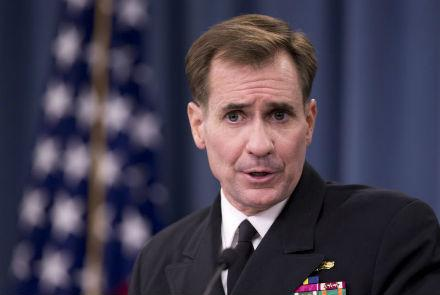US in Talks With Pakistan on Insurgent Safe Havens: Pentagon

Pentagon Press Secretary John F. Kirby at a press conference on Monday said that talks with Pakistan continue over the insurgents’ safe havens.
“We continue to have conversations with Pakistani leadership about the safe havens that exist along that border between Afghanistan and Pakistan,” Kirby said. “And we’re mindful that — that those safe havens are only providing a source of more insecurity, more instability inside Afghanistan.”
“And we’re not bashful about having that discussion with Pakistani leaders. We’re also mindful that Pakistan and the Pakistani people also are — fall victim to terrorist activities that emanate from that same region” he said.
“So, we’re all — we all have a shared sense of — of the importance of closing down those safe havens and — and not allowing them to be used by the Taliban or other insurgent networks to sow discord. And again, we’re having that conversation with the Pakistanis all the time,” he further said.
On support for the Afghan government forces, he said that the US is “continuing to support them — and I assume you’re asking about airstrikes, I’m guessing? Because we are helping Afghan forces in a myriad of other ways.”
“But I’m assuming that’s your question. And as I said, nothing has changed about the fact that we have the authorities to do it throughout the drawdown,” he noted.
“We have some capability to do it from obviously over the horizon, and the strikes that we have taken have all been from over the horizon. And we’ll continue to use those capabilities where and when feasible,” he stated.
“It’s not always going to be feasible in every case. And the Taliban has been making advances; there’s no question. The Afghans have capacity; they have capability, they have a capable Air Force,” accruing to Kirby.
“And as I said, weeks ago, I think, whatever the outcome here, when we look back, we’re going to be able to know, we’re going to be able to say, that it was driven by leadership, Afghan leadership, political and military leadership, that’s what’s vital here,” he said.
“We want all neighboring countries, all neighboring countries, to — to not take actions that make the situation in Afghanistan more dangerous than it is already, and to continue to try to use international pressure to get a negotiated peaceful political settlement to this war,” said Kirby.
Seeking an end to the Taliban’s attacks on Afghan provincial capitals, the UN envoy for Afghanistan, Deborah Lyons, on Friday said the UN Security Council should issue a statement against such an attempt by the group as the human toll of this strategy is extremely distressing and the political message is even more deeply disturbing.
Addressing the UN Security Council’s special meeting on Afghanistan’s situation, the UN envoy said Afghanistan is now at a dangerous turning point, adding that ahead lies either a genuine peace negotiation or a tragically intertwined set of crises: an increasingly brutal conflict combined with an acute humanitarian situation and multiplying human rights abuses.
In the past weeks, the war in Afghanistan has intensified. The Taliban campaign during June and July to capture rural areas has achieved significant territorial gains. From this strengthened position they have begun to attack the larger cities.
In recent days the Taliban intensified their attacks in the northern parts of the country, especially in Jawzjan, Samangan, Takhar, Balkh, Kunduz and Sar-e-Pul provinces.
With Aybak, capital of Samangan province which fell on Monday, the number of cities that fell to the Taliban recently has risen to five.
Zarang, capital of Nimruz, Sheberghan, capital of Jawzjan province, Taloqan, capital of Takhar, Sar-e-Pul, capital of Sar-e-Pul province and now Aybak, are the cities that are under Taliban control.
